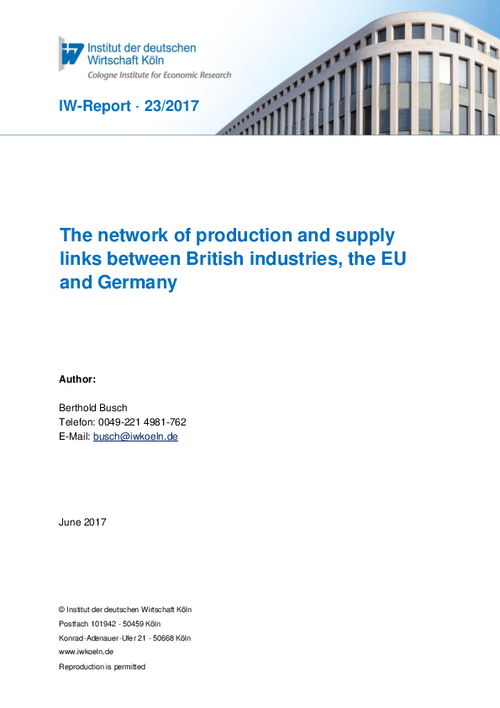If the British government has its way, when the United Kingdom (UK) withdraws from the European Union (EU), it will also leave the internal market and the customs union. This means that trade between the two economic areas will in future be hobbled by non-tariff trade barriers and, if the worst comes to the worst, by actual tariffs.

The network of production and supply links between British industries, the EU and Germany
IW-Report

If the British government has its way, when the United Kingdom (UK) withdraws from the European Union (EU), it will also leave the internal market and the customs union. This means that trade between the two economic areas will in future be hobbled by non-tariff trade barriers and, if the worst comes to the worst, by actual tariffs.
This may not only mean additional costs for end consumers, but would also affect those companies in the UK and the EU that are linked by value chains. In order to find out which industries will be particularly affected, this study examines data from the World Input-Output Database (WIOD) on the exchange of inputs between 56 industries in the UK and the EU on the one hand, and between the United Kingdom and Germany on the other. The majority of inputs exported from the UK to the EU are provided by service industries. In the other direction, the picture looks very different. Eight of the ten EU industries with the largest volume of intermediate products and services exported to the UK are in manufacturing. The inverse coefficients for the exchange of inputs between Germany and the UK are calculated for each sector. This shows how dense the network of links between these industries is. The value regarding German inputs sourced from Britain is the highest for other transport equipment, followed by coke and refined petroleum products and the basic metal industry. In terms of British inputs sourced from Germany, the inverse coefficients suggest that the industries most affected are automobile and chemicals.

Berthold Busch: The network of production and supply links between British industries, the EU and Germany
IW-Report


Inflation in der Eurozone: Der Weg bleibt holprig
Die Inflation in der Eurozone befindet sich auf dem Rückzug. Ein Aufatmen wäre aber verfrüht. Zweitrundeneffekte im Arbeitsmarkt sind im vollen Gange und setzen die Geldpolitik weiter unter Druck.
IW
Trump oder Harris oder …? Worauf sich Europa einstellen muss
Wenige Monate vor der Präsidentschaftswahl in den USA hat Donald Trump gute Chancen auf eine Wiederwahl. Auf Seiten der Demokraten hat der amtierende Präsident seine Kandidatur nach langem Zögern zurückgezogen, Vizepräsidentin Kamala Harris wird mit hoher ...
IW